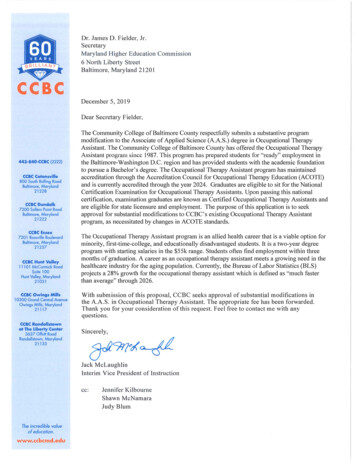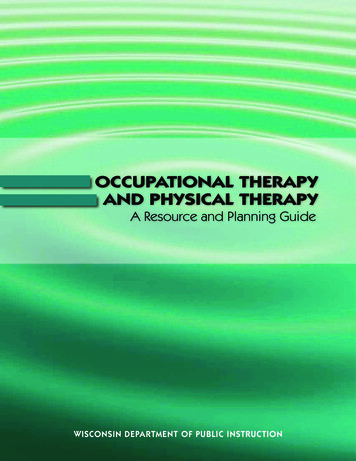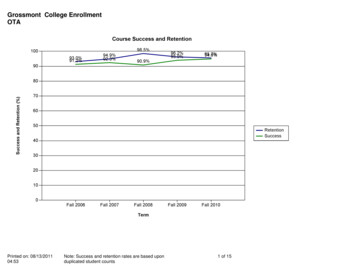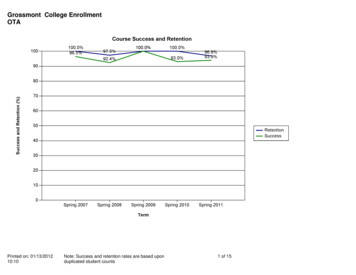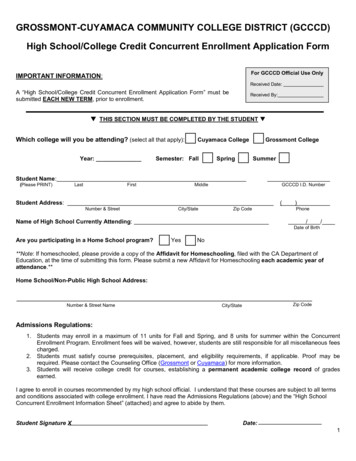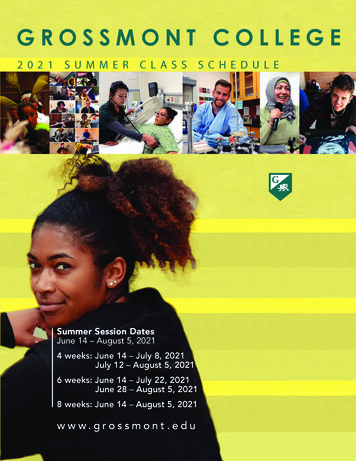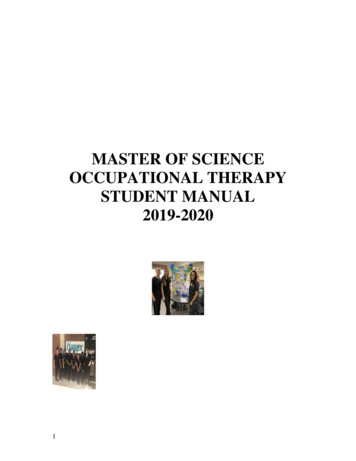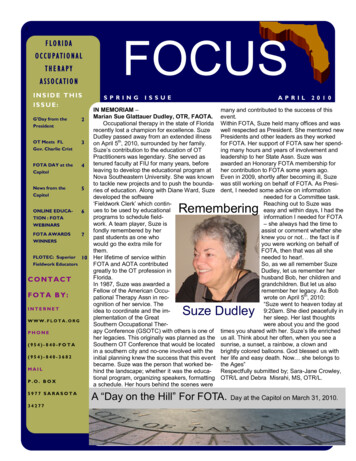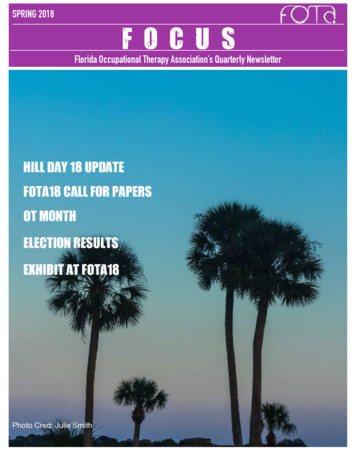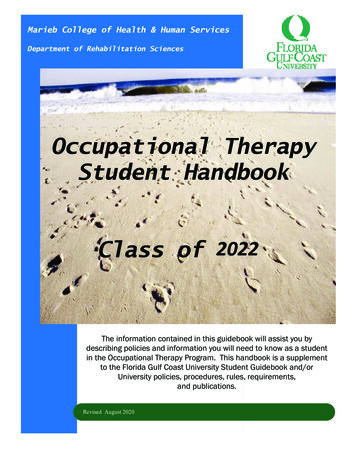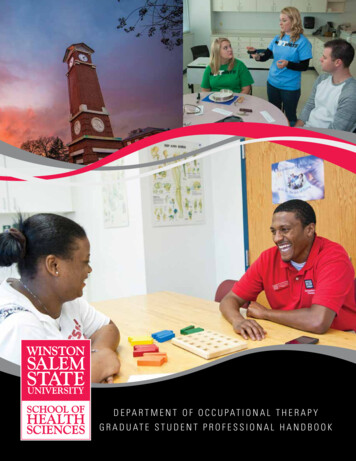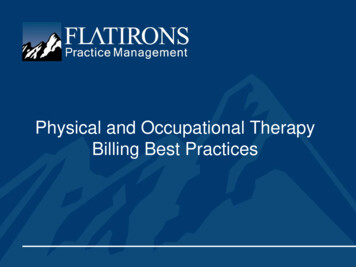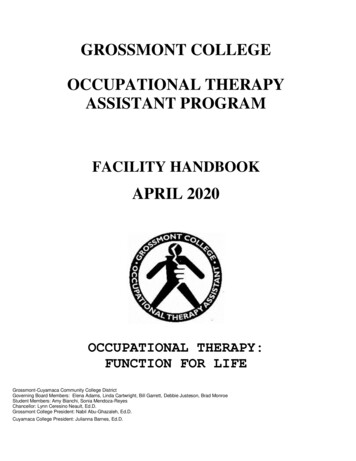
Transcription
GROSSMONT COLLEGEOCCUPATIONAL THERAPYASSISTANT PROGRAMFACILITY HANDBOOKAPRIL 2020OCCUPATIONAL THERAPY:FUNCTION FOR LIFEGrossmont-Cuyamaca Community College DistrictGoverning Board Members: Elena Adams, Linda Cartwright, Bill Garrett, Debbie Justeson, Brad MonroeStudent Members: Amy Bianchi, Sonia Mendoza-ReyesChancellor: Lynn Ceresino Neault, Ed.D.Grossmont College President: Nabil Abu-Ghazaleh, Ed.D.Cuyamaca College President: Julianna Barnes, Ed.D.
2 Page
3 Page
FACILITY HANDBOOKDEPARTMENT CONTACTS: OTA Program Director OTA Fieldwork Coordinator OTA Health SpecialistChristi VicinoJoyce Fries OTA E-mail Addresschristi.vicino@gcccd.edu program directorjoyce.fries@gcccd.edu fieldwork coordinator Website(619) 644-7304(619) 644-7307(619) /OTA Grossmont College8800 Grossmont College DriveEl Cajon, CA 92020-1799Ph: (619) 644-70004 Page
Occupational Therapy Assistant ProgramTABLE OF CONTENTSOTA Program Fieldwork InformationFieldwork Participants – Roles & Responsibilities .When to reach out to the OTA Program .How to reach out to the OTA Program .Documentation .Suggested Weekly Guidelines .Tips for Clinical Instructor .Tips for Good Communication .Attendance Policy.Failing Grade .Dress Code.Health and Safety Policy.Essential Functions/Accommodations Clinical Incident .Fieldwork Description.Fieldwork I Objectives .Fieldwork II Objectives .Fieldwork I Evaluation .Fieldwork Counseling Agreement .Developing Professional Behavior through Fieldwork .Fieldwork Educator Resources .OTA ProgramProgram Mission Statement and Philosophy .Definition of Profession .Approach to Learning/Instruction .OTA Program Objectives.OTA Program Student Outcomes/Competencies .OTA Curriculum Design.OTA Course Sequence .Course Descriptions .Council on Education and Commission on Education - AOTA .Code of 6464749515354Academic Policies of the CollegeDrug and Alcoholic Beverages .Social Networking Policy .Clinical Agreements .Transportation .Graduation.Student Code of Conduct .Method for Addressing Concerns/Issues .Appeal Form .6565676767687175Miscellaneous InformationStudents Injured in the Clinical Work Site .Students Injured on Campus s/district-injury-illness-rpt-2008.pdf5 Page
OTA Program Fieldwork Information6 Page
7 Page
FIELDWORK PARTICIPANTSROLES AND RESPONSIBILITIESFor a successful fieldwork experience for all concerned, a mutual understanding of responsibilities is encouraged.The following are recognized roles and responsibilities involved in the fieldwork experiences; the term/titles are thecurrently accepted terminology used by the Commission on Education.ACADEMIC FIELDWORK COORDINATORThe academic fieldwork coordinator is the faculty member at the educational institution who is responsible formonitoring the fieldwork experiences. Different faculty members may be assigned for Level I and Level II Fieldwork.The academic program director may act as the academic fieldwork coordinator or delegate the responsibility toanother faculty member. If the responsibility is delegate, the final authority and responsibility remains with theacademic program director.The responsibilities of the academic fieldwork coordinator include, but are not limited to, the following: assign eligible students to fieldwork experience and confirming the assignment in writing to each fieldworkeducatorassure that all written contracts or letters of agreement between the educational institution and fieldworkplacement are signed and periodically reviewedmake regular contacts with each fieldwork placement where students are located. On occasion anunannounced site visit may occur.maintain a current information file on each fieldwork placement where students are located; file shouldinclude fieldwork data form, overall statement of philosophy of treatment and site specific fieldworkobjectives for each item on the Fieldwork Evaluation for the Occupational Therapist (FEW) and theFieldwork Evaluation for the Occupational Therapy Assistant (FWEF)identify new sites for fieldwork placementdevelop and implement a policy for the withdrawal of students from a fieldwork placementorient students to the general purposes of fieldwork experience and providing them necessary formsreassign students who do not complete original fieldwork assignments in accordance with the educationalinstitution’s policiesupdate annually information to fieldwork sitesdevelop fieldwork experience programs that provide the best opportunity for the implementation oftheoretical concepts offered as part of the didactic curriculummaintain a collaborative relationship with fieldwork placements; andsend the necessary information and forms for each student and the fieldwork educator as stated in theACOTE Standards. These may include the review of FW Agreement Form and agreement for FW IIobjectives. Fieldwork educators may also be known as clinical educators, or student educators.8 Page
FIELDWORK EDUCATOREach individual responsible for student training in the fieldwork placement is considered a fieldwork educator.Fieldwork educators may also be known as clinical educators, fieldwork supervisors, clinical supervisors or studenteducators.The direct day-to-day supervisory responsibilities of the fieldwork educator include, but are not limited to thefollowing:o provide an adequate orientation to the facility and to specific departmental policies and procedureso supervise the provision of occupational therapy services, documentation, and oral reporting of thestudento assess the skill and knowledge level of the studento meet with the student regularly to review performance and provide guidance ensuring that regularstudent supervision is occurringo assign patients and clients to the studento notify student, fieldwork educators, and academic fieldwork coordinator in the event of any problemswith students that might require remediation plan or extension, to include safety issues or injury.o identify the philosophy and curriculum of the OTA Program through the use of the Curriculum DesignWorksheet to be collected by the academic fieldwork coordinatoro schedule site visit(s) in collaboration with the academic fieldwork coordinator and studento evaluate the student at the midterm and final of the fieldwork experience using the fieldworkevaluation form The original evaluation form must be signed by both the fieldwork educator and the student.A copy of the signed evaluation form shall be given to the OTA student and a copy must bee-mailed to the academic fieldwork coordinator within 5 business days from completion ofclinical rotation.o ensure students are meeting the organizational/facility requirements for health, immunization, safety,injury and confidentiality paperwork. Students come with a binder with the following: HIPAAcertificate, Background Check, Drug Screen, Physical Examination, TB, Malpractice Insurance, CPRCard, Flu shot or waiver, MMR, Hep B Seropositivity, TDAP and Varicella #1/#2 or seropositivity.o provide site specific objectives that support the educational model of the OTA Program.WHEN TO REACH OUT TO THE OTA PROGRAM: (some examples but not an exhaustive list)1. Early warning signs are important – the earlier we are alerted to an issue, the earlier we can providesupport and alternatives to student and site.2. Safety – Anything that leads to a safety issue is important to document and notify OTA Program of assoon as possible.3. Timeliness – As soon as a timeliness issue whether it is tardy, leaving early, or being late for scheduleactivities, or poor management of time, please notify the OTA Program.4. Preparedness – If a student is not prepared for the day or a treatment session because they did notprepare, note that and please notify the OTA Program.HOW TO REACH OUT TO THE OTA PROGRAM:1. If urgent - E-mail – best way to reach – joyce.fries@gcccd.edu2. Least efficient – as this is the office phone - Telephone call – Joyce Fries – 619-644-73073. If not urgent but needs to be noted - Weekly Progress Form – student to upload online each week9 Page
DOCUMENTATION:1. Please document training provided.2. Please document weekly meetings with the Weekly Progress Form and give to student to submit.3. Please document any additional meetings with specific issues discussed, expectations, resourcesprovided, and a deadline.4. If it is not documented, it did not happen .10 P a g e
STUDENTThe student is the learner who is enrolled in a course of study at an educational institution leading to a degree orcertificate in occupational therapy. The student is expected to collaborate with the fieldwork educator and theacademic fieldwork coordinator to ensure compliance with fieldwork experience requirements.The student is responsible for the following: complete and update a “binder for life” with all the required pieces of paperwork for your fieldwork andcareer. These forms may be required by your site and the student is responsible for providing acomplete packet of required forms to the site upon request. The following forms are required: HIPAAcertificate, Background Check, Drug Screen, Physical Examination, TB, Malpractice Insurance, CPRCard, Flu shot or waiver, MMR, Hep B Seropositivity, TDAP and Varicella #1/#2 or seropositivity andproof of medical/health insurance.comply with all policies and procedures of the fieldwork placement site and the student handbook.fulfilling all duties and assignments made by the fieldwork educator and academic field work coordinator,unless exempted, within the time limit specifiednotify the fieldwork placement and educational program of current address and telephone.complete and presenting to the fieldwork educator at least one copy of the student’s evaluation of thefieldwork placement, if requiredhave available copies of the appropriate performance evaluation forms and student evaluation formsunless forms are sent by the academic fieldwork coordinator; and evaluation forms unless forms aresent by the academic fieldwork coordinator; andbe an active participant in the supervisory process.In an event of any problem related to fieldwork evaluation, student will follow chain command atfieldwork placement, i.e. discuss problem with fieldwork educators and/or academic fieldworkcoordinator and if not satisfied with resolution, contact academic program director.Demonstrate appropriate professional behavior during all fieldwork activities. This includes notfraternizing with fieldwork educator, employees of facility, patients/clients or family members during workor after work hours.The student must collaborate with the Fieldwork Coordinator and the Fieldwork Supervisor.At least 1 contact with the Fieldwork Coordinator is mandatory during each fieldwork rotation. In theevent that the student is placed in a non-traditional site where there is no Occupational Therapistavailable, the director or fieldwork coordinator will provide weekly onsite supervision.The student must adhere to the work schedule set forth by the facility and OTA Program.The student must fulfill all of the duties and assignments set by the Fieldwork Coordinator and theFieldwork Supervisor within the specified time frames.The student must be an active participant in the process.The student must call (not text or email) the AFC and the program secretary PRIOR to the beginning ofthe shift in which she/he will be absent. Two or more absences will require a doctor’s note and will bemade up at the discretion of the fieldwork educator and/or fieldwork coordinator.And, finally, the student must be prepared to make mistakes! The supportive environment of thefieldwork site is meant to allow the student to take some risks. Mistakes allow students to reexamineand refine their learning and move to a higher level of understanding.Failure to follow the student responsibilities may result in a failed fieldwork rotation with the potential for no repeat.11 P a g e
GROSSMONT COLLEGEOccupational Therapy Assistant ProgramSuggested Guidelines for Level II FieldworkWEEK ONE:Orientation to the facility:Orientation to the Occupational Therapy Department. This may include orientation time with otherdisciplines and team member. Students are not employees of the facility – No fraternization with fieldworkeducators, employees of site, patients/clients or families.Orientation with OT/OTA supervisor. Share initial goals and expectations.Begin personal journal (daily diary) available to student on blackboard.Observe treatments and evaluations with therapists and other disciplines; attend appropriate in-services,conferences scheduled.Orient to documentation/paperwork required: including chart location; chart sections; charting styles.Review fieldwork expectations during internship including supervisory meeting, documentation and additionalassignments. (Please be aware that Academic Fieldwork Coordinator gives weekly assignments to students)WEEK TWO:Continue to attend in-services/meetings and observe supervisor's caseload.Initiate direct patient treatment with supervisor - i.e.: taking part in the therapy session, and/or group session (asdetermined by your supervisor).Review any/all department policies as appropriate, which were not covered on first week.Review patient handling techniques and safety issues surrounding patient treatmentTreat two assigned patients with supervision (co-treat) appropriately, with supervision.Observe and assist with group.Write daily progress notes on assigned patient/client and review with supervisor. Documentation must be accurate,clear, concise - Written and verbal.Develop and write a treatment plan. A treatment plan may be appropriate for group therapy; classroom activity;community activity.12 P a g e
WEEK THREE:Schedule a maximum of two fieldtrips (e.g. surgery, observation in another department or facility) and report tosupervisor within 3 days of completion.Build on co-treatment time with supervisor. Assuming caseload of two (or more) patients, with supervision asnecessary.Student to demonstrate ability to establish rapport with current patients in an effort to build therapeutic relationshipBecome more responsible for documentation - including daily progress notes on treatment sessions; treatmentplans.Plan and lead a group (as appropriate).Report on patient in rounds, or case conference, or staff meeting, as appropriate.WEEK FOUR:Continue to build on patient caseload.Review charts of two (or more) assigned patient/clients. Set goals and appropriate treatment plan for problems youidentify. Discuss with your supervisor.Begin (designated) section of an initial evaluation on a new patient with supervisor.Increase responsibility for documentation; including progress notes on treatment sessions.Review notes with preceptor(s) clinical educator(s)/supervisor(s) and write daily note in chart.WEEK FIVE:Add to your caseload.Become familiar with appropriate role of accountability for inventory orderingas appropriate to the OT department.Midterm Evaluation: Continue to review objectives and goals. Use the AOTA Fieldwork Performance Evaluation.Please provide honest, direct, clear feedback regarding student's performance. A copy of the signed midtermevaluation form shall be given to the OTA student and a copy must be e-mailed to the academic fieldworkcoordinator within 3 days.13 P a g e
WEEK SIX:Continue to build on patient caseload.Continue to work on a variety of treatment plans.Take the opportunity to lead a group, if available.WEEK SEVEN:Increase caseload as determined by supervisor.Demonstrate understanding of appropriate assessment tools appropriate toprimary caseload; equipment and supplies as appropriate to clinic needs and requirements.Demonstrate appropriate interaction with support staff and other disciplines.Continue objectives from week six.WEEK EIGHT:Maintain/increase caseload as determined by supervisor.Administer part/all of evaluation/assessment as per facility specifications (this may be limited to an interviewprocess; or actual administration of certain test batteries).Continue previous objectives.Demonstrate independence with a group(s) select patient/clients.Successfully written/modified treatment plans.Act as a primary COTA on a team.Display understanding of OT and COTA scope of practice.Demonstrate understanding of overall department fu
GROSSMONT COLLEGE OCCUPATIONAL THERAPY ASSISTANT PROGRAM FACILITY HANDBOOK APRIL 2020 OCCUPATIONAL THERAPY: FUNCTION FOR LIFE Grossmont-Cuyamaca Community College District Governing Board Members: Elena Adams, Linda Cartwright, Bill Garrett, Debbie Justeson, Brad Monroe Student Members: Amy Bianchi, Sonia Mendoza-Reyes
